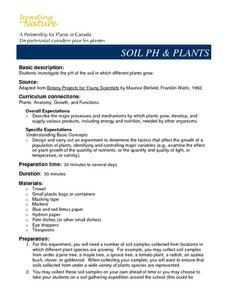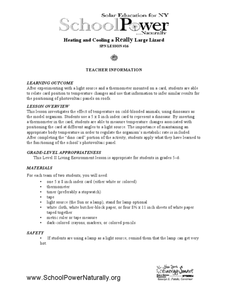Curated OER
Moon Crash
In this moon crash worksheet, students research information about the moon. In a given scenario, students decide which emergency supplies to take in order to survive on the moon.
Curated OER
Cricket Weather
In this collecting data worksheet, 4th graders use the data collected on crickets chirps and the temperature to make a line graph by following 4 directives.
Curated OER
Climate
In this climate worksheet, students will compare the climates of tropical and polar regions. Then students will determine what factors scientists use to determine the climate of a region. This worksheet has 6 short answer questions.
Curated OER
Worksheet 6
For this calculus worksheet, students are given 3 short-answer problems regarding Lagrange multipliers, highest and lowest temperatures, and radius.
Curated OER
Meteorology Math
In this math and science worksheet, learners calculate three temperatures at a given elevation when told the ground temperature. On two problems they are given the temperature at a specified elevation and students compute the ground...
Curated OER
Science Experiment: Take a Rainbow's Temperature
In this science experiment worksheet, students gather materials and perform an investigation using thermometers and prisms. Students are asked if red is hotter than blue. They answer 6 questions.
Curated OER
Combined Gas Law Problems
In this chemistry worksheet, students use the combined gas law to complete 9 short answer questions in which they calculate new volumes, .original pressures, and change in temperatures.
Curated OER
Sunlight & Soil
For this soil condition worksheet, students record the soil and air temperature as well as the day length and cloud cover in a small outside area for two weeks. They complete 5 short answer questions and draw graphs of the data.
Curated OER
Weather Map Challenge
In this weather worksheet students use a weather map to answer given questions. Students answer questions using map symbols and make predictions based on map. Students create additional questions with answers using the same map.
Curated OER
Temperatures and Reaction Rates
High schoolers participate in a hands-on activity in which they observe the effect of temperature on the rate of chemical reactions. Using Alka Seltzer tablets in different temperatures of water, they record the amount of time it takes...
Curated OER
The Effects of Temperature Variations on the Heartbeat Rate of Daphnia
Young scholars use DigiScope technology to investigate Daphinia, popularly known as water fleas. They design, conduct, and report on an experiment to determine the effects of varying water temperatures on the heartbeat rate of Daphnia.
Curated OER
Using Vegetation, Precipitation, and Surface Temperature to Study Climate Zones
Middle schoolers begin their examination of the climate zones found around the world. Using a software program, they identify the relationship between the vegetation, climate and temperatures of the different zones. They also plot...
Curated OER
High Mountain Retreat
Learners explore and analyze atmospheric conditions for a high mountain retreat. They examine the relationship between altitude, atmospheric pressure, temperature and humidity at a particular location. In addition, they write reports...
Curated OER
Ocean Currents and Sea Surface Temperature
Students use satellite data to explore sea surface temperature. They explore the relationship between the rotation of the Earth, the path of ocean current and air pressure centers. After studying maps of sea surface temperature and ocean...
Curated OER
Science: Let's Have a Cool Lunch
First graders develop problem-solving skills by designing methods for keeping lunch boxes cool. Once they determine the amount of sunlight and heat generated in shaded and unshaded areas, they explore ways to provide shade. Finally, 1st...
Curated OER
What Causes the Seasons?
Middle schoolers conduct experiment to examine how tilt of globe influences warming caused by lighted bulb. They monitor simulated warming of their city by sun in winter and in summer by using light bulb, interpret results, and submit...
Curated OER
Water Density and Salinity
Students observe how different water densities control the depth at which different water masses occur. They explain one fact that they comprehend about salt water. Students comprehend that temperature and salinity affect the density...
Curated OER
The Effects of Temperature on Chemical Mixtures
Students explore chemical cahnges and the effect of temperature on chemical mixturees, They make observations of the behavior and appearance of certain chemical mixtures and reactions.
Curated OER
Temperature in the Sun or Shade of the Desert
Third graders use thermometers to measure the air temperature in several
places around the school and then return to the classroom to record the data. They create a bar graph and discuss their findings about the air temperature in the...
Curated OER
Soil pH & Plants
Students investigate the pH of the soil in which different plants grow. They design and carry out an experiment to determine the factors that affect the growth of a population of plants, identifying and controlling major variables...
Curated OER
Meet the Weather Scientist
Fourth graders collect, record and analyze data using simple weather instruments or use weather resources to comprehend weather. They comprehend that scientists are very important people in today's world. Pupils look at cloud types to...
Rice University
What Should You Wear In Antarctica?
Students weigh various battings and feathers. They make sure to have the same weight of each type of insulations. Students wrap one bottle of warm water in each of the two insulations. They measure the temperature of each bottle,...
Curated OER
Heat Pollution and Communities
Learners examine thermal pollution by collecting temperature data on the school's photovoltaic panel. Students collect data for four consecutive days and retrieve information from other classes that meet at different times of the day. ...
Curated OER
Heating and Cooling a Really Large Lizard
Students investigate the effect of temperature on cold-blooded animals, using a 5 x 8 inch index card to represent a dinosaur as their model organism. Students measure temperature changes that occurs at different angles to a light...

























